There are various ways one can serve one’s country. Working as an overseas Filipino worker (OFW) is one; another is through working in the service of these OFWs as a DFA Foreign Service Officer (FSO) or a diplomat. So, how exactly do you become an FSO? What are the requirements, process, and preparation this entails? In this guide, we will shed light on these important questions and guide you to increase your chances of passing the Foreign Service Officer Exam (FSOE).
READ ALSO: 12 Reasons Why Filipinos Want to Work Abroad
If this is something that might be an option for you in the near future, then make sure to read until the end of this guide.
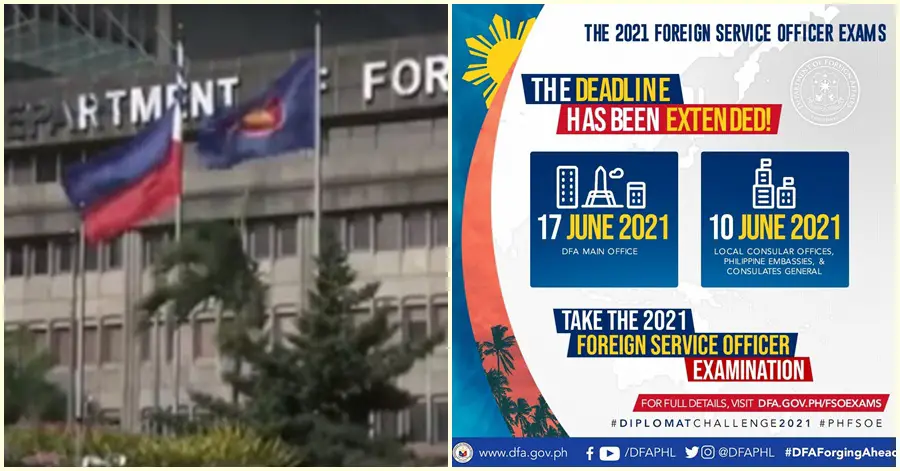
What is an FSO (Foreign Service Officer)?
According to the Foreign Affairs department, a Foreign Service Officer IV (FSO IV) functions as Principal Assistant/Assistant Director in the Department of Foreign Affairs’ Home Office, Third Secretary in Philippine Embassies/Missions, and Vice Consul in Philippine Consulates. This means that they will have administrative roles in ensuring that the home office’s operations are running as smoothly as possible.
As Principal Assistant/Assistant Director, the FSO IV manages entry-level and second-level workers engaging in research, analytical, and administrative duties. In addition, the FSO IV produces reports, correspondences, position papers, talking points, legal opinions or agreements, attends local and international meetings and conferences, and coordinates with government agencies and diplomatic missions on subjects related to his/her Division’s mandate.
As Third Secretary, the FSO IV may serve as either an Economic or Political Officer, or both. As Vice Consul, the FSO IV supervises entry-level and second-level consular workers in carrying out Consular Section tasks, serves as the Principal Officer in charge of situations involving assistance to nationals, and oversees the Administrative Section.
Qualifications / Eligibility
Below is a list of eligibility and qualifications for the FSOE exam:
- Citizen and permanent resident of the Philippines
- Graduate of any four-year Bachelor’s Degree Course
- 2 year’s work experience and or further studies
- No Age Limit
Document Requirements
In order to apply for the FSO, here are the requirements needed to bring and secure:
- Duly accomplished application form (download)
- Civil Service Form No. 100 (download)
- Photocopy of the transcript of records from the college or university from which the degree was obtained;
- Photocopy of Diploma or Certificate of Graduation from the college or university from which the degree was obtained;
- Proof of past or present employment or further studies;
- Photocopy of Birth Certificate issued by the Philippine Statistics Authority;
- Photocopy of Marriage Certificate (if applicable) and if married to a foreigner, authority to take the FSO Exams from the BFSE;
- Seven (7) pieces of photographs (4.5cm x 3.5cm) taken within three (3) months prior to the filing of application; and
- Copies of two valid IDs, with the original IDs to be presented upon submission.
How to Apply as a DFA Foreign Service Officer
So now that you have an idea of what it takes to be an FSO, you may be interested in how to apply for the exam. Below are the steps on how to apply for the FSO exams. Take note of the additional step prior to submitting the documents to ensure that there is a zero-contact policy applied in the acceptance of the applications. This is to prevent contacts given the current safety measures.
STEP 1. All applicants should submit the documents via email at bdse@dfa.gov.ph. Incomplete requirements will NOT be processed.
STEP 2. The DFA Board of Foreign Service Examination (BFSE) will evaluate the applicant’s documents and, if the documents are in order, will send an email to the applicant on the procedure for the payment.
STEP 3. Once documents are confirmed by the BFSE, the applicant is required to submit the hard copies of the documents in a sealed envelope through courier delivery or in person at the DFA Consular office in the Philippines or via PH Embassy/Consulate if abroad.
Address: The BFSE Secretariat
Department of Foreign Affairs, 2330 Roxas Boulevard, Pasay
City, 1300
STEP 4. Pay the non-refundable fee of PHP 500.
STEP 5. Once approved, the applicant will receive an email to take the Foreign Service Officer Examination (FSOE) Qualifying tests.
STEP 6. Applicant needs to pass the succeeding exam stages to successfully become a diplomat / foreign service officer. The exam stages include: Qualifying Test, Preliminary Interview, Written Test, Psychological Test, and Oral Test.
Foreign Service Exam Philippines
The FSO exam is one of the most demanding in the country. Those who have taken the exam before know that one of the reasons it is difficult is that it is tough to prepare for. Applicants will be asked a variety of questions regarding anything under the sun, and they must be able to remain calm, react, and defend their viewpoint.
Character, critical and strategic thinking, adaptability, decision-making, and above all, patriotism, integrity, professionalism, excellence, and service are more important than knowledge of current events and history, proficiency in international relations and diplomacy, and grasp of geopolitics and the global economy.
The DFA offers a service-oriented profession. The department has sworn to preserve the interests of the country and the Filipino people as public employees. FSOs are asked to do a lot by the Department, and they will be held to a high standard. FSOs must display the greatest levels of professionalism and excellence while staying courteous, respectful, and humble. FSOs are expected to remain on call 24 hours a day, seven days a week to respond to service emergencies. Foreign service is more than a job; it is a calling.
Stages of the Foreign Service Officer Exam – FSOE
- Qualifying Test
- Preliminary Interview
- Written Test
- Psychological Test
- Oral Test
The FSO Exam, also known as the FSOE, is held to find suitable candidates for the position of Foreign Service Officer, Class IV (FSO IV). Below are some sample questions for the Foreign Service exam:
The exam is made up of five tests that are delivered over the course of a year. To advance to the next section, you must pass each exam; if you fail one, you will be unable to proceed. They are listed in the following order: Preliminary Interview, Written Test, Psychological Test, and Oral Test are all examples of qualifying tests.
Let’s break down what you can expect in each of these parts:
1. Qualifying Test
This exam is made by the Civil Service Commission and is said to be like the civil service exam, only more “sophisticated”. Expect to be tested on mathematics, reading comprehension, language, logic, and a variety of other high-school and college-level subjects. This half-day exam (typically from 8 a.m. to 12 p.m.) appears to be designed to not be completed, and you’ll be under a lot of time pressure.
2. Preliminary Interview
The interview panel will consist of active officers in the Foreign Service corps. The interview will be conducted by three panelists who will ask you questions about your past, what you know, and what skills or knowledge you can bring to the Foreign Service. The panelists will attempt to establish whether or not you are a suitable fit for the task that lies ahead, as if it were a job interview. They may inquire about your personal life, professional life, and everything in between, just as they would in any job interview. The interview is said to take roughly 20 minutes or less if there is no waiting time.
Prepare to respond to queries such as, “What do you do in your current job?” “How can you help the DFA?” or “How can you help the DFA?” However, you may also be asked questions such as, “What can be done to ensure a meritocracy in DFA?”
3. Written Test
The Written Test is a three-day essay-style exam that runs from 8 a.m. to 4 p.m. each day. The Written Test is administered by the academe, while the Qualifying Test is administered by the Civil Service Commission and the Preliminary Interview is conducted by officers in the Foreign Service corps.
The Written Test will assess your abilities in the following areas over the course of three days:
- English (20%),
- Filipino (5%),
- Philippine Political, Economic, and Cultural Conditions (30%),
- International Affairs (20%),
- World History (20%), and
- Foreign Language (5%)
4. Psychological Test
This exam is performed at the Philippine Mental Health Association in small groups or pairs over the course of one day, from 8 a.m. to 3 p.m. Your mental talents as well as your psychiatric health will be assessed.
5. Oral Test
This test is broken down into three parts that are given over the course of two or three days. The formal dinner, the panel interview, and group dynamics. The Oral Test panelists will most likely be a mix of retired ambassadors, top-level officials from the Department of Foreign Affairs, big-wigs from other branches of the Philippine bureaucracy, such as the Department of Trade and Industry and the Department of Education, and other high-ranking officials.
Foreign Service Exam Sample Questions
To give you an idea of what this test looks like, here are some of the RANDOM SAMPLE QUESTIONS that popped up several years back, as shared in this article by Rappler:
English (20%)
- Discuss: Trade liberalization vs. Safety nets for PH agriculture and other industries.
- As an FSO, how would you improve the human resources in the PH bureaucracy both here and abroad (following the examples of Japan and Singapore)?
- As an FSO, how would you help address the country’s problems (i.e. income inequality etc.)?
- It is said that the Philippine political structure is an elite democracy that stems from a “semi-feudal economic system”. First, define elite democracy and semi-feudal then discuss how they are connected.
- Compared to its neighbors, the poverty rate in the Philippines is very high. Explain why this is so.
Filipino (5%)
- Discuss the following in three to five paragraphs:
- “Ang katagang “Ka” sa Diwang Pandaigdig ng Pilipino.”
- “Manny Pacquaio bilang bayani gaya ni Rizal at Ninoy”
- “Kailangan ang kapayapaan para sa kaunlaran”
- “Makatutulong ang globalization sa isang bansa”
- Translation work (from English to Filipino): President Aquino’s Vin d’Honneur Toast
- TIP: Like the English test, the Filipino exam assesses the examinee’s ability to express her/himself. Be prepared to discuss the following.
- Philippine arts
- Current PH issues
- The leftist movement
- Agrarian reform problems
- International issues concerning the PH
- English to Filipino translation and vice versa
Philippine Political, Economic, and Cultural Conditions (30%)
- Discuss the importance of OFW remittances to the PH economy.
- Discuss the social aspect of OFWs leaving their family behind.
- What is the effect of the appreciation of the peso to OFWs?
- How much is the current Philippine foreign debt?
- How does inflation affect the purchasing power of an individual?
International Affairs (20%)
- According to Kofi Annan of the UN, security and the protection of human rights are the foundations of development. Explain and relate this to the events of 9/11 and in international affairs.
- Did the 9/11 events serve as a turning point in international affairs/ policies?
- Will it be profitable for a country to prefer a regional trade alliance over a multilateral one? In what way?
- Explain the challenges the EU needs to hurdle now that it is expanding its membership. Explain along the lines of a common democratic tradition, the rising euro, migration, etc.
- What can you say about the dream of the ASEAN to have a common rules-based charter as in the EU?
World History (20%)
- Discuss the conditions that made the domination of Europe in the 16th century possible.
- Discuss how the following revolutions affected world history: (choose 3) Neolithic, Commercial, Industrial, Scientific, French, American Revolutions.
- What were the cultural, social, economic, and political factors for Europe’s ascendancy in the 16th century?
- Trace the history of the Middle East (from the Mesopotamian civilization to the present) and explain the Middle East problem as the West sees it.
- Compare and contrast Indian and Chinese Civilizations in terms of religion, political systems, social structure, and contributions.
Foreign Language (5%)
You’ll be asked to select one of the following languages ahead of time: Arabic, Bahasa Indonesia, Mandarin Chinese, French, German, Japanese, or Spanish.
As an overview, here are a few things to consider for JAPANESE: Master your katakana and hiragana and a few basic kanji. For the first part, you choose the pronunciation of the kanji and then supply the kanji for some words. Then you’ll be asked to interpret the meaning of a statement written in Japanese (multiple choice). For the last part, you’ll be asked to fill in the blank with the correct particle: ga, ha, no, he, kara, made, etc.
How to Become a Philippine Diplomat
This might be the first time you’ve heard of the position of a Foreign Service Officer. But since you’ll be representing the country when you become one, the duties and responsibilities associated with the post are not to be taken lightly, even the process of becoming one. It takes a well-rounded person, who’s got a heart to serve their country and fellowmen to fill in this prestigious role as a diplomat. If this resonates with you, be sure to note all of the things listed in this guide to help you prepare for the exam and increase your chances of becoming an FSO.
Disclaimer: This article is for information-sharing purposes only. If you have any specific concerns or questions regarding the exam or the results for the current year, you may visit the official website of the Department of Foreign Affairs at https://dfa.gov.ph/.
READ NEXT: List of DFA Consular Offices for Document Authentication
Infographic: DFA How to Become a Diplomat – Foreign Service Officer Exam
Below is a post from the Department of Foreign Affairs regarding the application for Foreign Service Officers:
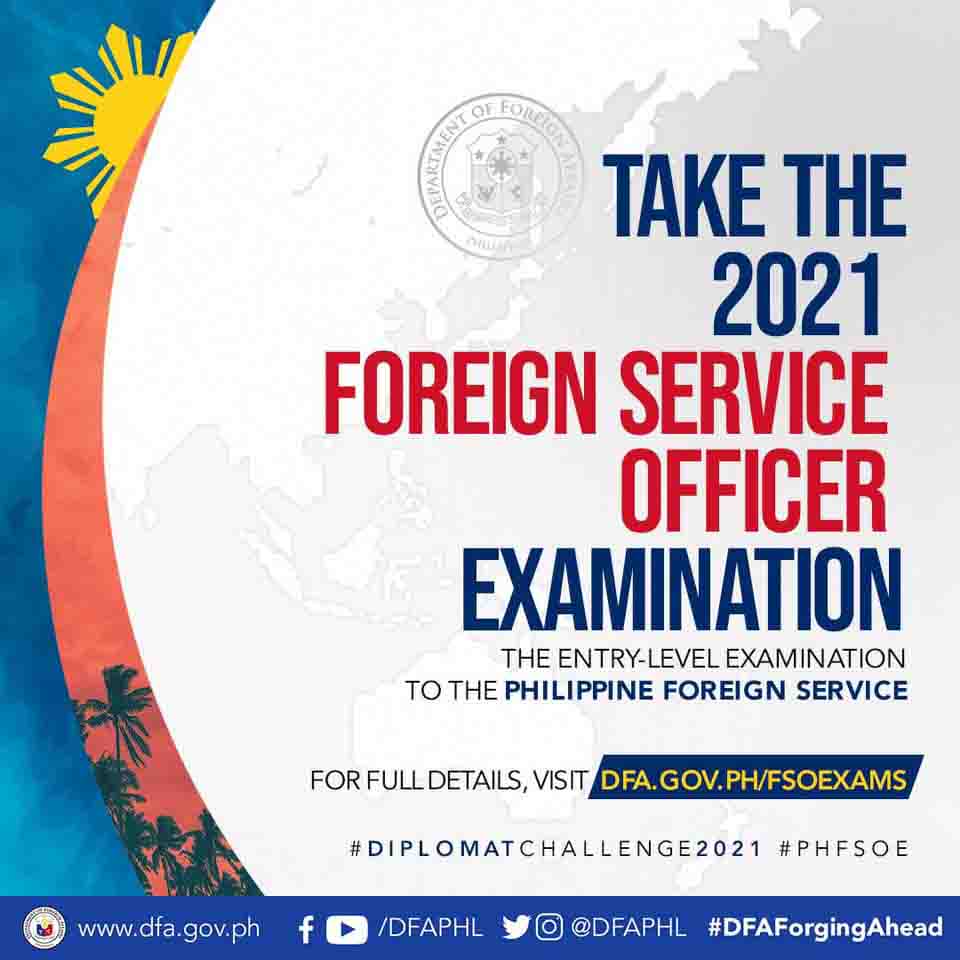
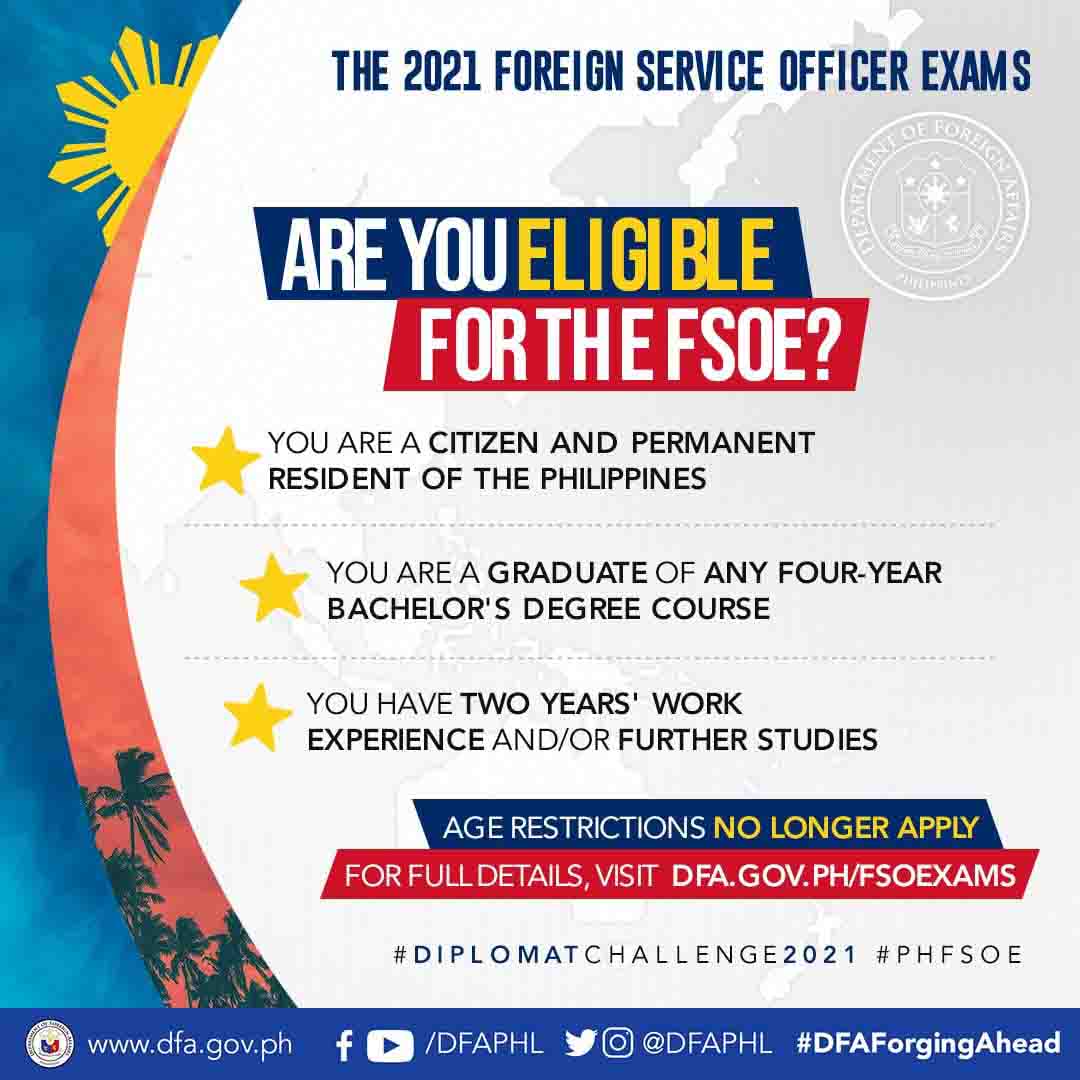
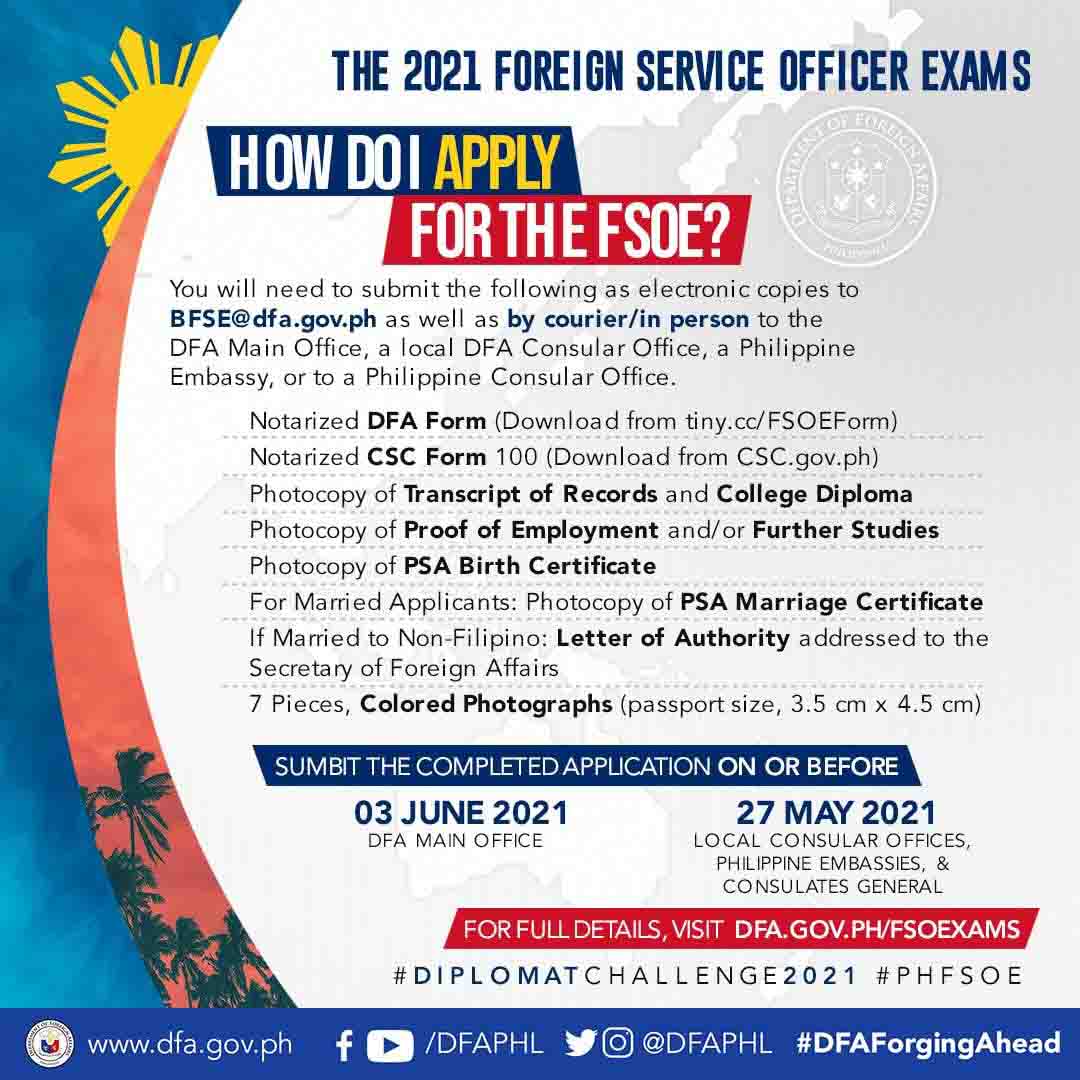
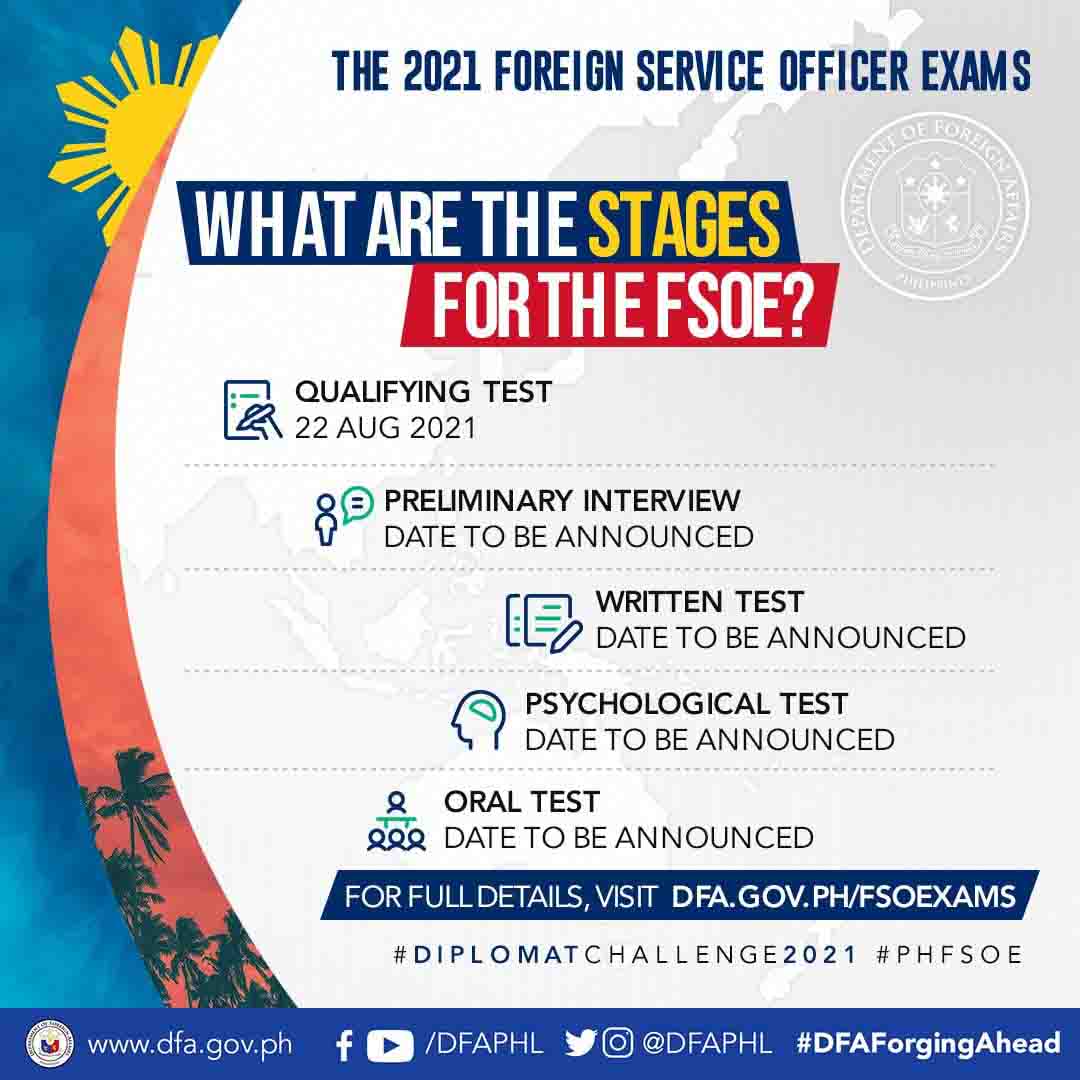
Contact Information
DEPARTMENT OF FOREIGN AFFAIRS
Address: 2330 Roxas Boulevard, Pasay City, Philippines
Telephone: (632) 8 834-4000 / (632) 8 834-3000
Website: https://dfa.gov.ph/
Facebook Page: https://www.facebook.com/dfaphl/